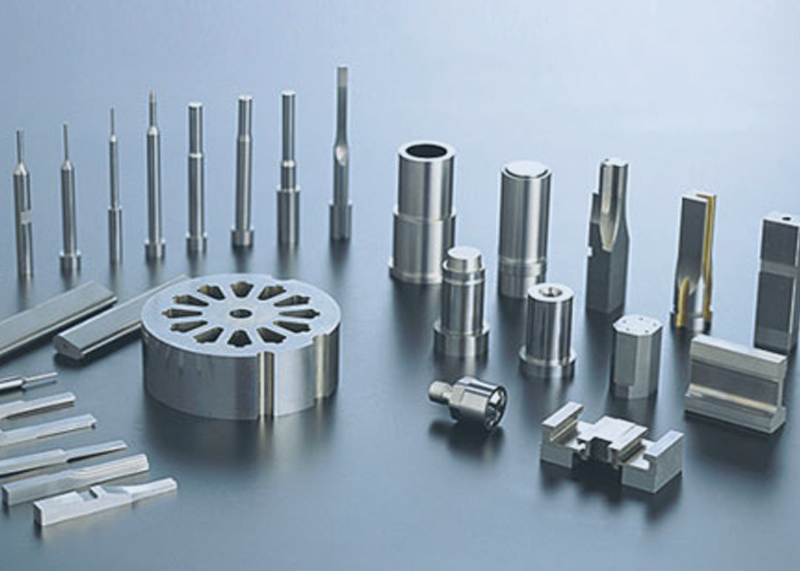What is Carbide Dies?
Carbide dies are specialized tools used in various manufacturing processes, especially in industries such as metalworking, plastics, and ceramics. These dies are composed of carbide, carbon, and one or more metal elements, typically tungsten, titanium, or tantalum. Carbide is renowned for its exceptional hardness, wear resistance and thermal stability, making it an ideal material for applications involving high-pressure forming or shaping operations. Carbides are commonly used in processes such as cold heading, cold forging, wire drawing and extrusion. In cold heading and forging operations, carbides are used to shape metal blanks into complex components such as screws, bolts, rivets, and fasteners. These dies withstand the extreme pressures and forces generated during the forming process, maintaining their shape and dimensional accuracy over thousands or millions of cycles.

An important advantage of carbide dies over conventional die materials such as steel or tool steel is their high hardness. Carbide has a much higher hardness rating than steel, allowing carbide to withstand abrasive wear and deformation more effectively. This extended wear resistance results in longer equipment life and less downtime for maintenance or replacement, increasing manufacturers' productivity and cost savings. Furthermore, carbide dies exhibit excellent thermal stability, allowing them to withstand the high temperatures generated during the manufacturing process without deforming or losing hardness. This thermal resistance is particularly beneficial in processes such as extrusion, where dies are subjected to intense heat and pressure as they form various profiles or shapes to the molten material.
Carbide dies can be produced with complex geometries and tight tolerances, enabling the production of components with complex shapes and precise dimensions. Manufacturers can customize carbide dies to meet the specific needs of various applications, including special coatings or surface treatments to enhance wear resistance and performance. In addition to their use in metalworking applications, carbide dies find applications in other industries such as plastics and ceramics. In plastics processing, carbides are used in extrusion and injection molding processes to shape molten plastic materials into various products such as pipes, tubing and profiles. In ceramic manufacturing, carbide dies are used to extrude or press ceramic powder into shapes such as tiles, bricks or technical ceramics. Carbide dies are indispensable tools in manufacturing processes that require high precision, durability and wear resistance. Their exceptional hardness, thermal stability and versatility make them ideal for a wide range of applications in industries. Carbide dies play an important role in modern manufacturing operations, enabling the efficient and cost-effective production of components with precise dimensions and complex geometries.
Features and Benefits of Carbide Dies
The Features and Benefits of carbide dies make them essential tools in various manufacturing processes in industries. Here's a detailed look at what makes carbide dies different, check bellow benefits of carbide dies.
Exceptional hardness:
Carbide dies are known for their exceptional hardness, which is significantly higher than conventional die materials such as steel or tool steel. This hardness allows the carbide to withstand the high pressures and forces encountered during forming or shaping operations without deforming or wearing out quickly. As a result, carbide dies offer extended tool life and less downtime for maintenance or replacement.
Superior Wear Resistance:
The hardness of carbides also contributes to their superior wear resistance. Carbide can withstand abrasive wear and deformation more effectively than steel, making carbide ideal for high-volume manufacturing processes that involve repetitive shaping or forming. Because of their excellent wear resistance, carbides maintain dimensional accuracy and surface finish over thousands or millions of cycles.
Thermal Stability:
Carbide dies exhibit excellent thermal stability, allowing them to withstand high temperatures generated during the manufacturing process without loss of hardness or mechanical properties. This thermal resistance is particularly beneficial in processes such as extrusion, where dies are subjected to intense heat and pressure as they shape the molten material. Carbides retain their integrity even under extreme temperature conditions, ensuring consistent performance and reliability.
Versatility:
Carbide dies find applications in a wide range of manufacturing processes in industries such as metalworking, plastics, ceramics and more. They are used in processes such as cold heading, cold forging, wire drawing, extrusion and injection molding to shape various materials into components with precise dimensions and complex geometries. The versatility of carbide dies makes them indispensable tools for manufacturers looking to optimize their manufacturing processes and achieve high-quality results.
Cost-Effectiveness:
Carbide dies may have a higher initial cost than traditional die materials, but their exceptional durability and wear resistance provide significant cost savings over time. With longer equipment life and less downtime for maintenance or replacement, carbide dies help manufacturers reduce operational costs and improve overall productivity. The long-term benefits of using carbides outweigh the initial investment, making them a cost-effective solution for demanding manufacturing applications.
The advantages of carbides make them indispensable tools in modern manufacturing operations. With their exceptional hardness, wear resistance, thermal stability, precision machining capabilities, versatility and cost-effectiveness, carbide dies enable manufacturers to achieve high-quality results and optimize their manufacturing processes across a wide range of industries.
